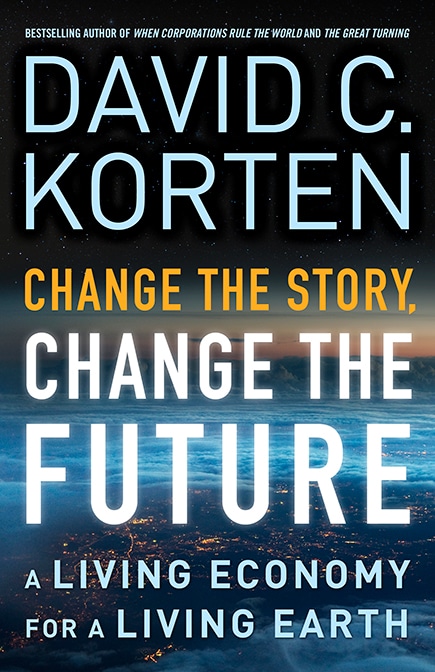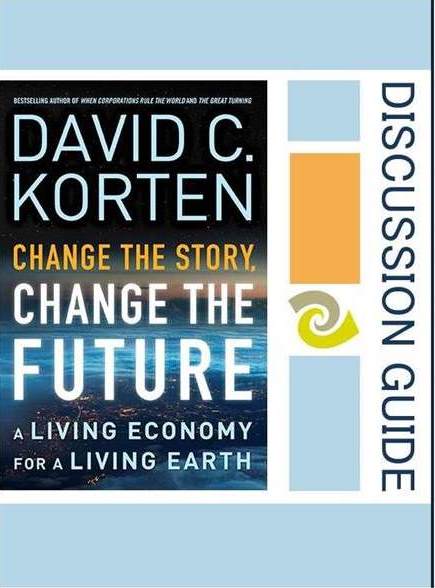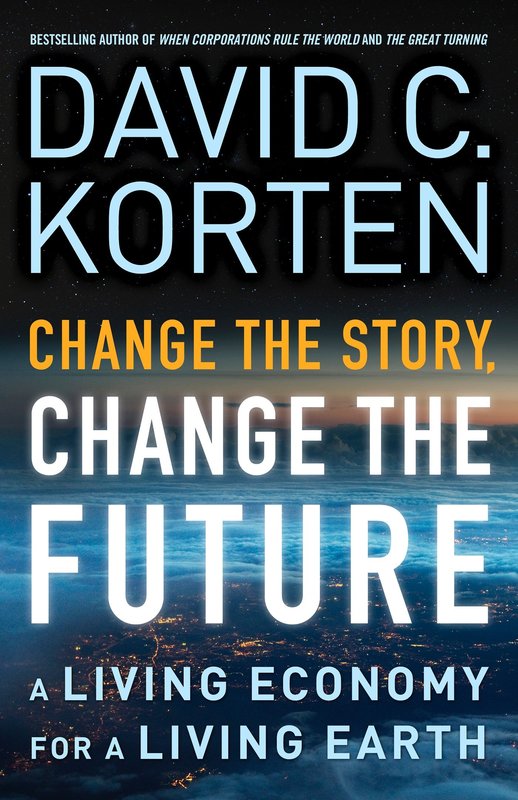Earlier in January, I had the pleasure of attending a lecture and a small group discussion at the University of Alberta with David Korten, the cofounder of Yes! Magazine and author of many books on the Human Venture reading list including Agenda for a New Economy: From Phantom Wealth to Real Wealth and The Great Turning from Empire to Earth Community.
The frontier of how we collectively manage threats and opportunities as a species is upon us. What Korten proposes in his most recent book Change the Future: A Living Economy for a Living Earth, is that the most significant work of our current place and time in history is to create and disseminate a collective, shared story that better prepares us to meet the realities of the situation facing humanity and our planet.
Korten says that we need to stop living by what he calls the Sacred Money and Markets Story where time is money, wealth is measured only by dollars and corporations are the main organizing unit of our way of living. Instead, he calls for a Sacred Life and Living Story where time is life, wealth is measured in real living wealth, where we recognize that life only exists in community and where “environmental sustainability, economic justice and living democracy are inseparable”.
As communities, societies and as a species, we function with shared stories. From a Human Learning Ecology perspective, understanding stories—how they came to be, how they equip us and how they constrain us—is foundational to understanding our human predicament.
As Korten opened his lecture he confided to the audience “You know, we are in trouble as a species.” With his experience working with low-income countries on development and participating in international conversations on the future of humanity through organizations like the Club of Rome, Korten became interested in tracking the impact of globalization and the consequences of a global corporate force that only values profit and growth. His life’s work has been focused on figuring out how we got into this mess and how we can get out. Getting the story right, according to Korten, will be foundational in navigating through the turbulent times that lie ahead.
Why? Life Orienting Stories (worldviews, belief systems, philosophies of life, cosmologies, etc.) shape our priorities, our plans and our actions. They influence how we define progress and our sense of what life is all about. The problem is, that like all stories, they can be incomplete or fallible. The current Life Orienting Story upon which our society has been operating is no exception.
The Sacred Money and Markets Story is a story that is rooted in the challenge of distributing resources to a population. While this is an age old problem that has been addressed in various ways with varying success in different local or regional contexts throughout human history, in a globalized world, the challenge is incredibly complex. Mixed with our undeveloped capacities to manage equality and equitability at this scale, we have designed an economy that is incredibly vulnerable to power grabs by corporations and the top 1%. Folding in the tale of the “American Dream” that if we just work hard enough we can rise to the top, culturally we have all been captured by this story.
It has told us that life is about accumulating money, our responsibility is to support economic growth and all we have to do is work our jobs and keep consuming to enjoy ‘the good life’. What it doesn’t tell us, is that the levels of consumption and growth that we are reaching have driven ecological destruction and climate change to the point of undermining the very life systems upon which we and future generations depend. We have set up a conflict between what it takes to survive and make a living within the economic system we have created and what it takes for our species to survive within the laws nature.
While many of us recognize this on some level, why haven’t we been able to change the story? One dangerous aspects of the Sacred Money and Markets Story is that it is coherent. It provides enough detail to provide us with meaning and give guidance to our lives. Because it feels complete or ‘good enough’, it stops us from questioning where it came from, for whom it is benefiting, what is missing and what the long term consequences might be. We carry on our individual lives according to the social norms that have arisen under this story and external authorities with narrow interests continue to perpetuate the narrative.
Another feature is that the Sacred Money and Markets Story doesn’t inform us on the full situation. We live within nested hierarchical situations, individual living within families, within communities, within regions, within countries, within planet Earth. Our current story has us focusing on the narrowest frames. It fails to inform us that the most significant challenges we face are playing out at the largest frame, that of our species and our planet. As Korten bluntly observed, our situation is looking grim. By taking in all of our situation, from the narrowest to the largest and including that in our orientation, we can start to understand what is required of us and where we should be building our capacities to meet the realities of our unfolding human situation.
In creating a Life Orienting Story that orients us to all of life and all of its complexities, we quickly recognize that it will never be fully complete however it must be comprehensive in providing enough detail to support wise action. While in recent years we have started to develop a fairly comprehensive narrative on the state of our planet, we must be open to ongoing testing and revision of our Life Orienting Story. We need to continue to build an accurate picture of where we are headed, what we should be paying attention to and what courses of action we should take. It is this inquiry process into the most significant aspects of life that allows us to course correct.
A well-developed Life Orienting Story should connect us to the largest, broadest story, that of life. It should remind us that we are part of two communities, the community of humanity and life. It should help us to realize that our own individual life stories are intimately linked to our shared collective story. How we inform ourselves, how we understand our biggest human challenges, what we take responsibility for and how we act, are integral to re-writing our shared Life Orienting Story.
Korten encourages us to recognize that we live by the stories we tell ourselves and it is in this story-telling that we can create a better future. The Sacred Life and Living Story reads in part,
“We humans are living beings born of and nurtured by a Living Earth. Real wealth is living wealth. Time is life. Money is just a number useful as a medium of exchange in well-regulated markets.
Life only exists in community. We humans are creatures of conscience who survive and proposer only as members of a Living Earth community. The prime task of any living community is to maintain the conditions essential to the life of its members. We all do best when we all do well in a world that works for all…”
Reading these words, or even better digging into his book, I would encourage you to test it and ask yourself “What is significant that this story is orienting us to?”, “How does it shape our responsibilities?” and “What would it look like to live by this story?”







_1.jpg)